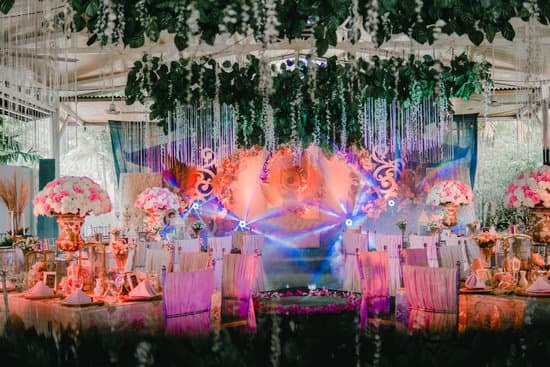What is a reasonable wedding budget? Setting a wedding budget is an essential step in the wedding planning process, as it ensures that you can enjoy your special day without financial stress. In this article, we will explore the significance of setting a reasonable wedding budget, factors to consider when creating one, average costs of key wedding elements, tips for prioritizing your budget, real-life examples of different wedding budgets, and strategies for saving money without compromising on quality.
When it comes to planning a wedding, setting a realistic budget is crucial to help you make informed decisions and avoid overspending. From the venue to entertainment and catering, every element of a wedding comes with its own costs. Understanding how to allocate your resources effectively can make a significant difference in the overall success of your celebration.
In the following sections, we will delve into the various aspects of creating and maintaining a reasonable wedding budget. Whether you are working with limited financial resources or simply want to be mindful of your spending, this guide will provide valuable insights into finding the perfect balance between your dream wedding and a practical budget. So let’s dive in and discover how you can make the most out of your wedding budget.
What Factors to Consider When Setting a Wedding Budget
When setting a wedding budget, it is essential to consider several factors to ensure that you are allocating your funds wisely. One of the most important considerations is the number of guests you plan to invite.
The size of your guest list will have a significant impact on the overall cost of your wedding, as it will affect expenses such as catering, venue size, and seating arrangements. Additionally, the location of your wedding will also play a crucial role in determining your budget, as different regions have varying costs for services and accommodations.
Another factor to consider when setting a wedding budget is your priorities as a couple. It’s important to sit down with your partner and discuss what aspects of the wedding are most important to you both. Whether it’s the venue, food, entertainment, or something else entirely, identifying your priorities will help you allocate funds more effectively.
Furthermore, it’s essential to take into account any additional expenses that may arise during the planning process. From unexpected vendor fees to last-minute decor additions, having a contingency fund built into your budget can provide peace of mind and alleviate stress as you approach your big day.
| Factor | Considerations |
|---|---|
| Number of guests | Size of guest list impacts catering cost and venue selection |
| Location | Different regions have various costs for services and accommodations. |
| Couple’s priorities | Determine what aspects are most important for allocation of funds. |
Average Costs of Key Wedding Elements Such as Venue, Catering, and Entertainment
When planning a wedding, one of the most important steps is to set a budget. This budget will guide all of your decision-making throughout the planning process and ultimately determine the type of wedding you can afford. One of the key factors to consider when setting a wedding budget is the average costs of key elements such as the venue, catering, and entertainment.
The venue is often one of the biggest expenses when it comes to a wedding. On average, couples in the United States spend around $6000 for their wedding venue. However, this cost can vary widely depending on factors such as location, size, and time of year. For example, a wedding venue in a major city may cost significantly more than one in a rural area.
Catering is another major expense to consider when setting your wedding budget. Couples typically spend around $70 per guest on catering for their big day. This cost can fluctuate based on factors such as the style of service (plated dinner vs buffet) and menu choices (chicken vs steak). Finally, entertainment such as a DJ or band can cost an average of $1000 – $2500 depending on their experience and popularity.
| Wedding Element | Average Cost |
|---|---|
| Wedding Venue | $6000 |
| Catering (per guest) | $70 |
| Entertainment (DJ or Band) | $1000 – $2500 |
Tips for Creating a Wedding Budget That Reflects Your Priorities
When it comes to creating a wedding budget, it’s crucial to ensure that it reflects your priorities and allows you to allocate funds where they matter most. Here are some tips to help you create a wedding budget that aligns with your values and vision for your big day:
1. Identify your priorities: Sit down with your partner and make a list of the elements of your wedding that are most important to you. Whether it’s the venue, the food, or the entertainment, knowing what matters most to you will help you allocate your budget accordingly.
2. Research average costs: Take the time to research the average costs of key wedding elements such as the venue, catering, and entertainment in your desired location. This will give you a realistic idea of how much each component might cost and help you set a more accurate budget.
3. Allocate funds based on importance: Once you have identified your priorities and have an understanding of average costs, allocate funds to each aspect of your wedding based on their importance to you as a couple.
Remember that what is considered a reasonable wedding budget can vary greatly depending on factors such as location, guest count, and personal preferences. By following these tips, however, you can create a budget that reflects what matters most to you while keeping costs in check.
Real-Life Examples of Different Wedding Budgets and How They Were Allocated
When it comes to planning a wedding, setting a reasonable budget is crucial. One of the factors to consider when setting a wedding budget is understanding the average costs of key wedding elements. Below are some average costs to help you allocate your budget effectively:
- Venue: The venue often takes up a significant portion of the overall wedding budget, with costs varying depending on factors such as location, size, and amenities. On average, couples can expect to spend anywhere from $3,000 to $12,000 on their wedding venue.
- Catering: Food and drinks are another major expense for weddings. The average cost for catering can range from $40 to $100 per person, depending on the menu selection and service style.
- Entertainment: Whether it’s a live band or a DJ, entertainment is an important aspect of any wedding celebration. Couples typically allocate around $1,200 to $3,000 for entertainment services.
Now that you have an idea of the average costs of key wedding elements, it’s time to create a budget that reflects your priorities. Consider what aspects of your wedding are most important to you and your partner.
Real-life examples of different wedding budgets can provide valuable insights into how couples allocated their funds for their special day. Here are a few scenarios:
- Couple A prioritized an extravagant venue and allocated a larger portion of their budget towards securing a stunning location for their ceremony and reception.
- Couple B focused on creating an unforgettable dining experience for their guests and invested more in high-quality catering services.
- Couple C opted for DIY decorations and utilized their creativity to save money while still achieving the aesthetic they desired.
These examples demonstrate that there is no one-size-fits-all approach to allocating a wedding budget. By understanding what elements matter most to you as a couple, you can tailor your budget accordingly while still achieving the wedding of your dreams.
Remember that flexibility is key when it comes to sticking to your budget without sacrificing quality. Finding ways to save money without compromising on the overall experience will allow you to create a memorable and meaningful celebration within your means.
How to Save Money and Stick to Your Budget Without Sacrificing Quality
Planning a wedding can be a costly affair, but there are ways to save money and stick to your budget without compromising on the quality of your big day. Here are some tips to help you achieve this:
Prioritize Your Must-Haves
Before allocating your budget, sit down with your partner and make a list of the elements that are most important to both of you. Whether it’s the venue, food, photography, or entertainment, identify your top priorities so that you can allocate more funds to these areas while cutting back on others.
DIY Where Possible
Consider incorporating do-it-yourself (DIY) elements into your wedding to save money. From handmade decorations to homemade wedding favors, embracing a DIY approach can add a personal touch to your special day while reducing costs.
Get Creative With Timing and Logistics
Choosing a less popular time for your wedding, such as a weekday or off-peak season, can result in significant cost savings. Additionally, consolidating services by finding a venue that offers catering and entertainment packages can help reduce expenses.
By carefully considering your options and being resourceful, it is possible to have the wedding of your dreams without overspending. Remember that it’s not about how much money you spend; it’s about celebrating your love in a way that feels authentic and meaningful to you as a couple.
The Importance of Flexibility in Your Wedding Budget
Planning a wedding can be both an exciting and stressful time, as couples attempt to balance their dream wedding with the constraints of a reasonable budget. Flexibility is key when it comes to successfully planning a wedding that fits within your financial means while still achieving the vision you have for your special day.
Understanding Your Priorities
Before diving into the specifics of your wedding budget, it’s important to understand what your priorities are for the big day. Sit down with your partner and make a list of the elements that are most important to you. Whether it’s a stunning venue, top-notch catering, or an amazing band, knowing where you want to allocate the majority of your budget will help guide your decision-making process.
Being Open to Alternatives
One way to stay flexible with your wedding budget is by being open to alternative options for various elements of your wedding. For example, if your dream venue is out of reach financially, consider having the ceremony at a less expensive location and having just the reception at the pricier venue. Similarly, explore different catering options such as food trucks or family-style dining rather than a traditional sit-down meal.
Allowing Room for Unexpected Expenses
No matter how carefully you plan your wedding budget, unexpected expenses are bound to come up. Whether it’s extra floral arrangements or last-minute alterations to the wedding dress, having some flexibility in your budget will allow you to address these additional costs without feeling overwhelmed. By building in a buffer for unforeseen expenses, you’ll be better prepared to handle whatever comes your way without blowing your budget.
Conclusion
In conclusion, setting a reasonable wedding budget is essential for couples who want to achieve their dream wedding without breaking the bank. It’s important to consider various factors when determining your budget, such as the average costs of key wedding elements like the venue, catering, and entertainment. By understanding these costs and creating a budget that reflects your priorities, you can ensure that you allocate funds to the most important aspects of your special day.
Real-life examples of different wedding budgets and how they were allocated can provide valuable insight for couples embarking on their wedding planning journey. These examples showcase how couples have successfully managed to create their dream weddings within a reasonable budget by making informed decisions and prioritizing what matters most to them.
Furthermore, finding the perfect balance between your dream wedding and a reasonable budget requires flexibility. By being open to alternative options and willing to make compromises in certain areas, couples can save money without sacrificing quality. Ultimately, with careful planning and thoughtful consideration, it is possible to have the wedding of your dreams while staying within a reasonable budget.
Frequently Asked Questions
What Is the Basic Budget for a Wedding?
The basic budget for a wedding can vary widely depending on a number of factors such as location, number of guests, and the couple’s personal preferences. However, a common starting point for a basic wedding budget is around $20,000 to $25,000. This includes costs for venue, catering, attire, photography, and other essential services.
What Is a Good Budget for a 100 Person Wedding?
A good budget for a 100 person wedding typically falls in the range of $20,000 to $35,000. This allows for expenses such as venue rental, catering, attire, photography/videography, decor, entertainment and other related services to accommodate all the guests.
It’s important to prioritize expenses within the given budget based on what is most important to the couple.
What Is the Biggest Expense of a Wedding?
The biggest expense of a wedding tends to be the reception costs which include venue rental fees, catering expenses (food and beverages), as well as any additional decorations or entertainment.
These costs can often make up a significant portion of the overall wedding budget and require careful planning and consideration in order to stay within budget while still hosting an enjoyable event for all attendees.

I have been involved in marriages for over 20 years helping couples and singles understand more about them.





